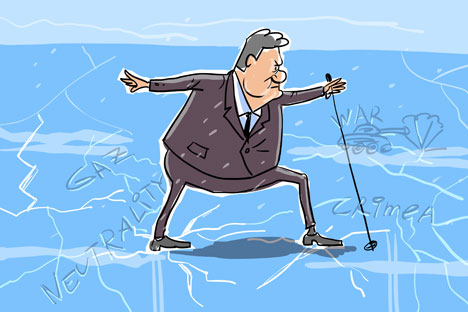
Drawing by Alexei Iorsh. Click to enlarge
Back in early May, it seemed that Moscow would reject the result of Ukraine’s presidential election. Russia kept stressing the legitimacy of Viktor Yanukovych, who was overthrown in February, and therefore the illegitimacy of all further actions by the interim authorities in Kiev, including the announcement of the election.
However, then Russia’s stance began to soften. Russian President Vladimir Putin met Ukraine’s President-elect Petro Poroshenko on the sidelines of D-Day celebrations in France on June 6 and Russian Ambassador to Ukraine Mikhail Zurabov returned to Kiev to attend Poroshenko’s inauguration on June 7.
What does Russia expect from its neighbor’s new leader? Russia's requirements for Ukraine were outlined a long time ago and have not changed. Russia wants Ukraine to be a decentralized state that guarantees the broad cultural, language and administrative rights of its eastern and southeastern territories, the region known as the Donbass.
Russia also wants Ukraine to maintain its neutral status in regards to all European and Euro-Atlantic structures. In the two months of fighting in the east of the country, it has become clear that Moscow is not interested in repeating the Crimea scenario anywhere else in Ukraine, including the Donbass, although Russians do sympathize with the local population there.
Kiev is already full of rumors of Poroshenko's alleged plans for secret deals with the Kremlin. As a man of business who knows how to resolve matters, he indeed may try to find approaches to Moscow bypassing rhetoric and ideology.
However, this will not be so easy to do from the point of view of the domestic political situation: despite receiving quite a convincing mandate in the May 25 election, Poroshenko does not have a political movement of his own to support him. This is particularly risky in the world of Ukrainian politics, which is made up of endless intrigues, money and changes of positions.
One condition for Moscow's interaction with the new Ukrainian president is, of course, the cessation of the military operation to suppress pro-Russian rebels in the country’s east. Poroshenko has the possibility to change the course of events there since formally he is not responsible for what happened under the interim authorities.
Although the president has more than once expressed his full support for the tough measures taken by the Ukrainian authorities in the Donbass, a change of position after coming to power is not an unusual thing in politics.
Poroshenko orders to open corridor for civilians to leave combat zone in southeastern Ukraine
Press Digest: Poroshenko sworn in as new president of Ukraine
Over 7,000 Ukrainian citizens enter Rostov region in past 24 hours
There can be no bargaining on Crimea, which Poroshenko has promised to return to Ukraine. Under no circumstances will Russia be discussing the issue of where Crimea belongs. If a general constructive dialogue is established, there can be a discussion of technical things such as compensation or ownership issues related to properties on the peninsula, but Poroshenko should not begin his interaction with Russia on this topic, given the current level of mutual trust.
Russia has no intention of recognizing the "people's republics" in eastern Ukraine but, for obvious moral and political reasons, it cannot simply abandon them either. Moscow would like the groups in eastern Ukraine opposed to the Kiev authorities to become a serious political force within the Ukrainian political system.
Poroshenko should be interested in this as well, since there is a need for representatives from the eastern part of the country who can engage in dialogue with Kiev.
A key topic for gauging the two sides' ability to work together is the resolution of the disagreements on gas, including the issues of debt payment, transit and future prices. It appears that Russia is ready to show more flexibility than before, fully realizing that a new gas war would do serious damage to Russian energy giant Gazprom. But first, Ukraine should at least repay the old debts, which still remain a problem.
Since Europe is eager to remove a possible interruption of gas supplies from the agenda, a compromise is possible. If a way out of the deadlock is found on gas, it will create at least some positive momentum for discussion on other topics.
Moscow is skeptical about Ukraine's prospects under any leadership, since the recent political upheavals have not resulted in a change of the political elite there and the quality of the previous elite is well known. Yet, despite an extremely negative attitude to the events in Maidan, it appears that Russia would like to stabilize relations with Ukraine.
Ending the fighting in the east in a way that would allow all its participants to save face is an important precondition for Russia’s relations with Ukraine to move forward. Poroshenko’s ability to take the first steps in this direction will determine the road the countries will travel in the future.
Fyodor Lukyanov is the editor-in-chief of Russia in Global Affairs and chairman of the board of the Foreign and Defense Policy Council.
All rights reserved by Rossiyskaya Gazeta.
Subscribe
to our newsletter!
Get the week's best stories straight to your inbox